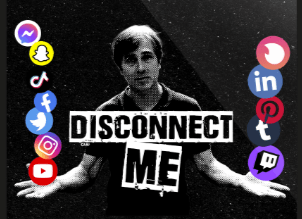Without a doubt, the smart phone is one of the greatest technological inventions the world has ever seen, giving us the ability to connect anywhere, communicate, entertain, educate and run a business.
According to global data and business intelligence platform, Statista, 86.3 per cent of Australians use a smartphone – that’s almost 23 million people.
Australian filmmaker and director of the Marrickville Theatre Company, Alex Lykos (Alex & Eve, Me & My Left Brain), wanted to find out for himself exactly what would happen if that crucial device was removed from his daily life.
How would he and those around him react? What would he do for hours on end when unable to check out other people’s social media accounts?
And what would become of his own mental health?
In his latest film, Disconnect Me, Lykos commits to the experiment, locks his own iPhone – actually all his devices – in a home safe for 30 days.
Did he survive the challenge?
Well, what started as a “simple digital detox” soon spiralled into something far more sinister that left him facing unexpected personal, professional and mental health challenges.
The experiment mirrors US documentary filmmaker Morgan Spurlock’s groundbreaking 2004 documentary, Super Size Me – which is still as relevant today as it was almost 20 years ago – where he eats only McDonalds fast food for 30 days.
Speaking to The New Daily ahead of the film’s national cinema release next month, Lykos says his interviews with school students, parents, professionals and academics left him seriously questioning the relationship we have with our smart phones.
He speaks to Dr Catriona Wallace (Shark Tank), founder of Metaverse Alliance, the chief scientist at the UNSW AI Institute, Toby Walsh and Amanda Third, from Digital Social and Cultural Research at Western Sydney University.
Back to a vanished lifestyle
He also explores the role of artificial intelligence, with chilling results.
“There is one particular revelation about the threat of AI on humanity which absolutely shocked us, and it deserves some mainstream attention,” said Lykos.
But what was it like to be without your phone, your best friend, your 24/7 companion?
“The first few days were very difficult, there was a withdrawal you feel within addiction … something that has been with you for so long and suddenly the phone was no longer available,” he says.
“After the first three days, it got a lot easier, especially the social media component … that was the easiest not to worry about because I fall into the rabbit hole of scrolling through apps, seeing who’s bought a new car or been to Hawaii … and I feel worse for it.
“I felt better – was in my own head a bit more.”
What could go wrong?
“I felt isolated … calling, texting, communicating with family and friends, but they all had phones. You normally touch base with them on the phone,” he said.
“I lost that. That got difficult.”
Reliance on his phone hit hardest when he was unable to pay invoices, which needed an SMS code to a phone before proceeding. Physically going into a bank is the other option, but his wife paid the bills on her phone.
Using QR codes to check in and to order food in restaurants, which also can only be done by phone: “All these things add to being dependent on the phone”.
When Spurlock directed and starred in Super Size Me, the film shed light on the rapidly growing obesity crisis in America, and it has generated discussion in health, medical, ethical and academic circles ever since.
Someone has to be a guinea pig
Between February 1 to March 2 in 2003, he ate only a diet of McDonalds for 30 days three times a day, supersizing portions when offered, and put on a massive 11.1 kilograms.
Then 32, he consumed an average of 20.9 megajoules or 5000 kcal (the equivalent of 9.26 Big Macs) per day. He also walked about two kilometres a day.
Subsequent similar experiments questioned his side-effects, which also included heart palpitations, liver problems, lack of sex drive and muscle mass loss.
Not being able to take any medications throughout the experiment, he developed higher cholesterol and blood pressure.
It took him 14 months to lose that 11.1kg.
In 2005, the documentary was nominated for an Academy Award for Best Documentary Feature and won Best Documentary Screenplay from the Writers Guild of America.
McDonalds dropped their Supersize option six weeks after the film launched, and replaced it with the Happy Meal.
The 2014 Australian documentary, That Sugar Film, was also centred around one man’s determination to find out whether too much sugar in our diet is bad for us.
Over 60 days, Damon Gameau changing from his normal diet containing no refined sugar to consuming 40 teaspoons of sugar a day through eating packaged foods which looked healthy – like granola bars and breakfast drinks.
Our iPhone ‘relationship’
Again, the film spoke to experts and health researchers to take us through the science as he revealed he put on 8kg, his skin broke out and just 18 days into the experiment he developed fatty liver disease.
So, was Lykos happy to get his iPhone back?
Yes, but he’s going to treat it with more respect, and have a relationship with it rather than an obsession.
“That is the over-arching theme of the movie,” he said.
“We know that smart devices are here to stay and they offer many great tools to enhance our lives, but have you ever wondered – who controls who?”.
Disconnect Me premieres in cinemas nationally on October 19
The post ‘Digital addiction’: Aussie filmmaker locks his iPhone in safe for 30 days – what could go wrong? appeared first on The New Daily.







